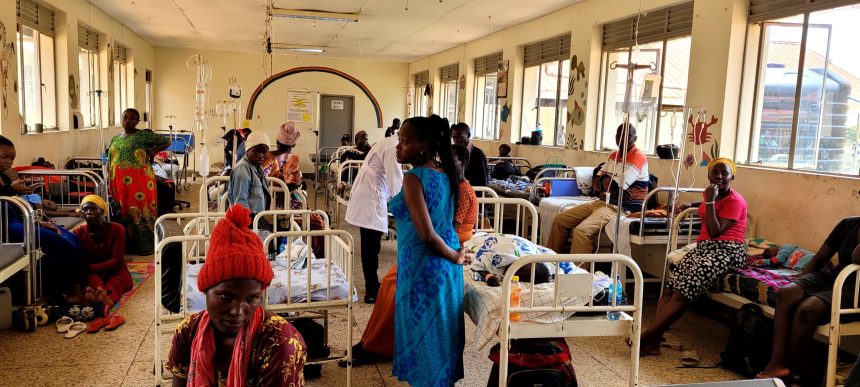In response to escalating concerns raised by the community, the Bugisu Sub-region’s ONC coordinators conducted a thorough investigation into the operational challenges plaguing Mbale Regional Referral Hospital.
On Thursday, the ONC Bugisu Team visited Mbale Regional Referral Hospital for a three day fact finding mission headed by Chris Buyera accompanied by Jalia Namasaba, Shaban Kachimete and Wandulu Zaidi.
What they uncovered paints a distressing picture of systemic failures hindering both access to healthcare and the hospital’s ability to deliver essential services effectively.

From their findings, Mbale City Authorities have been defiant with the presidential Directive of moving away Pharmacies and Private Health Facilities from Hospitals, In Mbale the Hospital is surrounded by over 10 pharmacies and Private Facilities which are said to be owned by Doctors working in the Region Referral Hospital.
Some of the medical workers are accused of referring patients intentionally and they get commission at the end of the day for each patient. The team also established that the gates of the hospital is overcrowded with special hires and Boda Bodas and they recommended that Mbale City Council Authorities act upon it with immediate effect.

However the Biggest issue is the insufficient blood supply, Zemei Sylvia the In charge ACUTE told the team that they loose over 35 children every month due to lack of blood. Last Thursday four children have been reported by the facility authorities to have died due to insufficient blood.
Among other myriad issues identified during the visit were:
1. Boda Boda Congestion: The hospital’s gates are besieged by crowds of motorcycle taxis, making access difficult for patients, visitors, and ambulances alike.
2. Special Hire Stage Obstruction: Another gate, adjacent to the Masaba Wing, serves as a special hire stage, exacerbating congestion and impeding hospital operations.
3. Gate Blockages: Critical entrances to the hospital, including Kumi Road, are obstructed by motorcycles, while the hospital’s immediate vicinity is inundated with pharmacies, clinics, and laboratories, further complicating access.
4. Presence of Unauthorized Personnel: Numerous individuals, purportedly affiliated with external health centers, loiter within the hospital premises, hindering the delivery of care.
5. Inadequate Security: With only four aging policemen tasked with securing a facility serving over 5000 individuals, concerns regarding safety and security within the hospital compound are paramount.
6. Road Disrepair: Potholes mar the main entrance road, rendering it impassable and contributing to delays in critical care provision, potentially resulting in preventable deaths.
7. External Interference: A charcoal store situated adjacent to the hospital disrupts operations, while reports indicate that several illegal entry points compromise security measures.
8. Medicine Shortages: The National Medical Stores’ inadequate supply of essential medications, exemplified by the absence of artemisinin-based combination therapy (ACT) for malaria treatment, directly contributes to patient morbidity and mortality.
The gravity of these challenges is compounded by the revelation that the Mbale City Clerk holds a seat on the hospital’s management board, raising questions about conflicting interests and potential conflicts of interest.
Despite previous attempts to address these issues with local authorities, including the Mbale RCC’s office, prioritization of revenue generation over service delivery remains a persistent obstacle.
As the primary healthcare provider for Eastern and Northern Uganda, Mbale Regional Referral Hospital’s ability to fulfil its mandate is undeniably compromised by these multifaceted challenges. Urgent intervention from government agencies is imperative to rectify these systemic shortcomings and ensure equitable access to quality healthcare for all.








